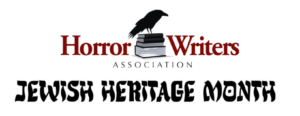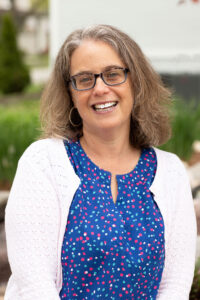Jewish Heritage in Horror: An Interview with Becky Spratford


Becky Spratford [MLIS] is a Readers’ Advisor in Illinois specializing in serving patrons ages 13 and up. She trains library staff all over the world on how to match books with readers through the local public library. She runs the critically acclaimed RA training blog RA for All. She is under contract to provide content for EBSCO’s NoveList database and writes reviews for Booklist and a horror review column for Library Journal. Known for her work with horror readers, Becky is the author of The Reader’s Advisory Guide to Horror, Third Edition [ALA Editions, 2021]. You can follow Becky on Twitter @RAforAll.
What was it about the horror genre that drew you to it?
Horror is a genre that is driven by emotions. How it makes you feel. I am always in awe of how authors can take letters and put them together into words, that form sentences, that eventually form stories that can make the reader feel real emotions in their physical body. Words on a page, making me feel anxious, making me feel dread, making me actually afraid. It never ceases to amaze me. In my books about the genre and my Horror reviews, I focus on that emotional response and how each author does this in their own unique way. That is why I am drawn to it.
What has writing taught you about how to express your Jewishness or the experiences you’ve had as someone who is Jewish?
I have been writing about stories for as long as I can remember. As a student, I took many courses analyzing literature, and one thing that always came up was applying a “Jesus” lens to stories. As a kid who grew up in the Jewish tradition, spending 2 days a week at Hebrew school, and having most of my family’s social life revolve around the synagogue, I had to teach myself about Jesus in order to keep up in these classes and add to the discussion. Interestingly, I never thought of this as problematic; it was just the way things had to be, I thought. This is a common issue for those with marginalized identities; systemic oppression means we must conform, and yet we don’t question that we have to.
This is a common issue for those with marginalized identities; systemic oppression means we must conform, and yet we don’t question that we have to.
But then, in Junior year of college, I took a class that changed everything. It was called Jewish American Literature. I got to read only Jewish authors, some I had never read before. And I got to discuss these works from my lens— being an American Jew. There were some non-Jewish kids in the class, and I watched them struggle, while I, for the first time in my life, got to discuss novels without trying. It was eye opening to me. Since then, I have refused to force a “Jesus” lens to my interpretation of what I read. I analyze and critic works on how they work for me and my personal experience because novels, especially Horror, need to work for all readers, not just those who are Christian. Everyone should be able to feel the fear.
How do you feel the Jewish community has been represented thus far in the genre and what hopes do you have for representation in the genre going forward?
Unfortunately too much is tied to the Holocaust, still. As the granddaughter of a Holocaust refugee I understand why, but there is so much more to Jewish horror than Holocaust allegories. We are an ancient people, with a long tradition of storytelling with monsters and folklore that can be explored without adding real life atrocities into the mix to enhance it.
I don’t fault the authors however. This is a publishing problem. It happens with many marginalized identities. People think the marketplace can only sustain stories that the white, cis, Christian dominant culture can relate to and for Jewish stories, “relating” means the Holocaust. Thankfully, as we are seeing with all publishing, but especially in Horror, an increase in marginalized voices exploring Horror from their unique perspectives and the results have been AWESOME! I am excited both to see my identity explored in more Horror stories, but also to experience Horror from news perspectives. It is an exciting time to feel the fear in so many new ways.
Who are some of your favorite Jewish characters in horror?
I have always been intrigued by the golem. I first learned about this creature in Hebrew school as a young kid. We were taught about the most famous golem, made by a Rabbi in Prague, to protect the Jewish community from persecution, but then it went a bit rogue and had to be deactivated. Not too long after this lesson, I became more aware of Frankenstein and could see the parallels to that important novel and the ancient stories I was learning about in Hebrew School.
As an adult, one of my favorite books to feature a golem was Helen Wecker’s The Golem and the Jinni which imagines the Arab and Jewish magical creatures as 19th Century immigrants in NYC and speaks to how they manage in the new world and their friendship. While more dark fantasy or historical fiction than Horror, it is still one of my favorite modern depictions of the golem. It capture this magical creature’s legacy and importance to Judaism perfectly.
Who are some Jewish horror authors you recommend our audience check out?
Barbara Barnett is a Cantor and an excellent author. Her debut novel, The Apothecary’s Curse, was finalist for the Bram Stoker Award for First Novel. Judaism is infused into everything she writes. It is effortless, beautiful, and unsettling.
Ruthanna Emrys writes in one of my favorite Horror subgenres. I call it Reimagining Lovecraft. These are stories written by those who Lovecraft would have hated in real life— women, people of color, Jews— who use their identity to reframe Lovecraftian stories. In these works it is as if the authors are both thanking Lovecraft for the subgenre he created and giving him the middle finger at the same time. Emrys’ Innsmouth Trilogy is a great example of this.
Maxwell I Gold is a newer voice. His prose poems and short stories tend toward the weird and cosmic side of Horror. He is an author to keep an eye on.
To the Jewish writers out there who are just getting started, what advice would you give them?
Embrace your culture in the stories you tell. Being Jewish is a spiritual ethnicity. Many of us cannot help but see the world through our Jewish identity; it is inseparable from who we are and how we express ourselves. Share your authentic self in your stories. Do not try to confirm to the dominate culture. Horror is in a renaissance precisely because people from a diverse breadth of identities are mining the horror of their marginalization and the unique stories from their identities to create new terrifying worlds for all of us to experience. And the results are wonderful for every reader looking for great Horror.



